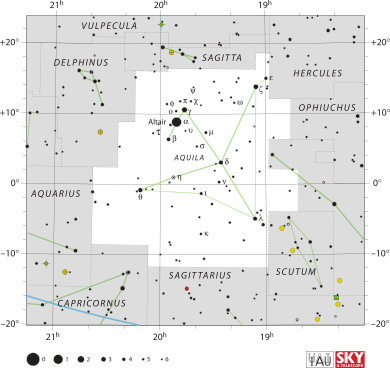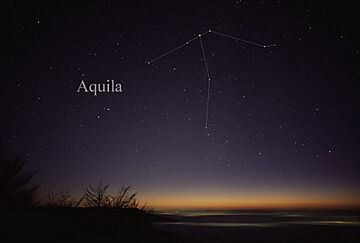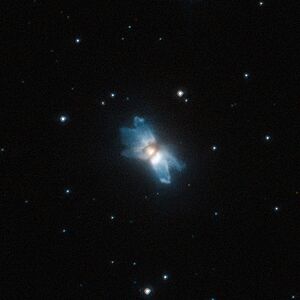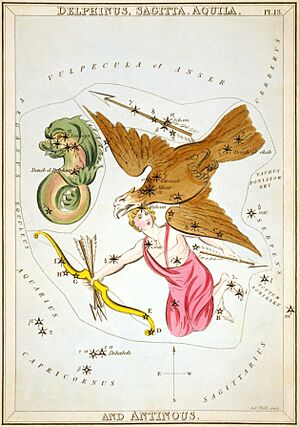Aquila (constellation) facts for kids
| Constellation | |

List of stars in Aquila
|
|
| Abbreviation | Aql |
|---|---|
| Genitive | Aquilae |
| Pronunciation | Áquila, occasionally genitive |
| Symbolism | the Eagle |
| Right ascension | 18h 41m 18.2958s–20h 38m 23.7231s |
| Declination | 18.6882229°–-11.8664360° |
| Area | 652 sq. deg. (22nd) |
| Main stars | 10 |
| Bayer/Flamsteed stars |
65 |
| Stars with planets | 9 |
| Stars brighter than 3.00m | 3 |
| Stars within 10.00 pc (32.62 ly) | 2 |
| Brightest star | Altair (α Aql) (0.76m) |
| Messier objects | 0 |
| Meteor showers |
|
| Bordering constellations |
|
| Visible at latitudes between +90° and −75°. Best visible at 21:00 (9 p.m.) during the month of August. |
|
Aquila is a constellation that looks like an eagle in the night sky. Its name comes from the Latin word for 'eagle'. In ancient Greco-Roman mythology, Aquila was the eagle that carried the thunderbolts of the god Zeus (or Jupiter).
You can find Aquila near the celestial equator, which is like Earth's equator but in space. Its brightest star, Altair, is part of a famous group of stars called the Summer Triangle. This constellation is easiest to see during the northern summer. It's located in the Milky Way, our home galaxy. Because of this, Aquila has many star clusters and nebulae (clouds of gas and dust).
Contents
History of the Aquila Constellation
Aquila is a very old constellation. It was first written about by the Greek astronomer Ptolemy in the second century AD. Before that, other ancient astronomers like Eudoxus and Aratus also mentioned it.
Today, Aquila is one of the 88 official constellations recognized by astronomers worldwide. The ancient Romans sometimes called it Vultur volans, meaning "the flying vulture." It is often linked to the eagle that carried Zeus's thunderbolts. Another story says it's the eagle that took Ganymede, a prince, to Mount Olympus to be a cup-bearer for the gods.
The Greek idea of Aquila probably came from an older Babylonian constellation that also looked like an eagle.
Stars and Other Features in Aquila
Aquila is in the Milky Way, so it has many bright star fields. It has also been the site of several novae, which are stars that suddenly become very bright.
Bright Stars in Aquila
- α Aql (Altair) is the brightest star in Aquila. It's one of the closest stars you can see without a telescope, about 17 light-years away. Its name means "the flying eagle" in Arabic. Altair is very bright, with a magnitude of 0.76. It's one of the three stars that make up the Summer Triangle. Altair spins very fast, which makes it look a bit flattened at its poles.
- β Aql (Alshain) is a yellow star about 45 light-years from Earth. It has a magnitude of 3.7. Its name comes from an Arabic phrase meaning "the balance."
- γ Aql (Tarazed) is an orange giant star, about 460 light-years away. It's the second brightest star in Aquila, with a magnitude of about 2.7. Like Alshain, its name also relates to "the balance."
- ζ Aql (Okab) is a double star system, 83 light-years from Earth, with a magnitude of 3.0.
Novae in Aquila
In 1918, a very bright nova appeared in Aquila. It was called Nova Aquilae 1918. For a short time, it shone even brighter than Altair! It was the brightest nova ever recorded since the invention of the telescope.
Deep-Sky Objects in Aquila
Aquila has several interesting nebulae, which are glowing clouds of gas around dying stars.
- NGC 6804 looks like a small, bright ring.
- NGC 6781 looks a bit like the Owl Nebula.
- NGC 6751, also known as the Glowing Eye, is about 0.8 light-years wide.
There are also open clusters, which are groups of stars born from the same cloud of gas and dust.
- NGC 6709 is a loose cluster with about 40 stars. It's about 3000 light-years away.
- NGC 6755 is another open cluster, about 8,060 light-years from us.
Aquila also contains W51, one of the largest "stellar nurseries" in our galaxy. This is a huge area where new stars are forming. It's about 17,000 light-years away and is so thick with dust that we can't see it with regular telescopes.
Astronomers have also found something huge in Aquila called the Hercules–Corona Borealis Great Wall. It's thought to be one of the largest groups of galaxies in the entire Universe, stretching for 10 billion light-years!
Other Interesting Facts
The Pioneer 11 space probe, launched by NASA in the 1970s, is expected to fly near the star Lambda (λ) Aquilae in about 4 million years.
How Aquila is Pictured
When you see pictures of Aquila as an eagle, a line of three stars often forms part of its wings. The middle and brightest star in this line is Altair.
Mythology of Aquila
In ancient Greek stories, Aquila was known as Aetos Dios, the eagle that carried the thunderbolts for the god Zeus. Zeus also sent this eagle to carry a young shepherd boy named Ganymede to Mount Olympus to serve as a cup-bearer for the gods. The constellation Aquarius is sometimes linked to Ganymede.
In a Chinese love story called Qi Xi, the star Niu Lang (Altair) and his two children (Beta and Gamma Aquilae) are separated forever from their wife and mother Zhi Nu (Vega). She is on the other side of the Milky Way, which is seen as a river.
In Hinduism, the constellation Aquila is connected to Garuda, a powerful deity who is half-eagle and half-human.
Ancient Egyptians might have seen Aquila as the falcon of Horus, one of their important gods.
Aquila in Other Cultures
In Chinese astronomy, some stars of Aquila are part of the Heavenly Market Enclosure, and others are in the Black Tortoise of the North.
Many Polynesian cultures also had their own names and stories for the stars in Aquila.
- On Futuna, it was called Kau-amonga, meaning "Suspended Burden."
- In Hawaii, Altair was called Humu, which means "to sew" or "to bind."
- In the Marquesas Islands, the whole constellation was called Pao-toa, meaning "Fatigued Warrior."
- The people of Pukapuka called the three bright stars (Alpha, Beta, and Gamma Aquilae) Tolu, meaning "three." They also used Altair, which they called Turu, for navigation.
- The Māori people of New Zealand called Altair Poutu-te-rangi, meaning "Pillar of the Sky." It was very important in their calendar and was linked to the annual sweet potato harvest.
See also
 In Spanish: Aquila (constelación) para niños
In Spanish: Aquila (constelación) para niños
 | Lonnie Johnson |
 | Granville Woods |
 | Lewis Howard Latimer |
 | James West |




